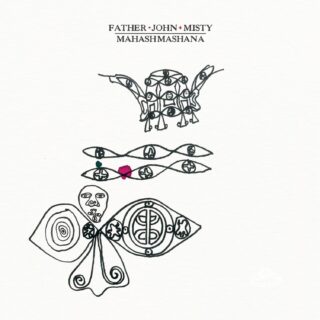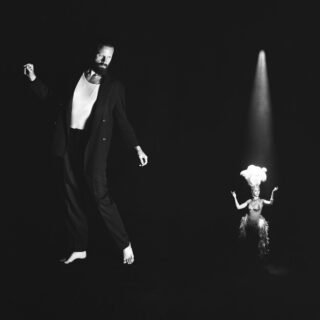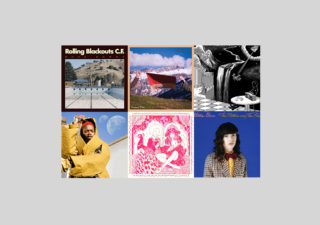He tells me how you can almost hear the confusion of the hired-in backing vocalists on the track. “It’s very disruptive,” he says. “You need that counterbalance, and that’s what I’m trying to create: a very tenuous, albeit inhabitable space for these diametrically opposed sentiments.
“So anyway,” he suddenly says, “there certainly are moments that are a bit of a red herring. The album title itself is a total red herring. That song [the title track] is about these two defeated cynics who are in love [specifically Tillman and Garr]. Y’know, like, ‘I can’t believe I’m even saying this. Is this what two people in love even say? I love you, honeybear.’
“I’ve never had any problem wildly misrepresenting myself. I enjoy that, and that’s happening in this thing on an atomic level. I mean, the name – Father John Misty??!!”
One day in Big Sur, California, having walked out of the most successful folk band of the last decade, Josh Tillman, high as you like, took off his clothes, climbed a tree and came back down as Father John Misty. It’s a stupid name that means nothing, and that’s what pleases Tillman the most – he gets a kick out of seeing it on posters and T-shirts and illuminated signs outside venues.
The natural assumption is that he’d created a fictional alter ego – his own Ziggy Stardust – and not simply because of the number of mushrooms he’d ingested. Father John Misty wasn’t just replacing Fleet Foxes, it was also killing off an 8-album solo career under the name J. Tillman. So which of the two projects were people going to presume was the more autobiographical?
The J. Tillman records were miserable affairs – albums of minimal acoustic guitar and whispered lyrics, seemingly tailored for the scenes at the end of The O.C., when news had just broken that a teenage student had drowned. Says Tillman: “There was one dimension to those J. Tillman records, and humour was obviously not on the menu.”
As one J. Tillman record moped into the next with little-to-no progression, it slowly dawned on their author that there was no longer much of his true self in them. He’d spend seven years (from 2003 to 2010) walking in the wrong direction, noting today that from the very beginning he’d been pursuing an unattainable archetype of what a singer-songwriter is. “That was when the problems started,” he says, “when I discovered this songwriter archetype. When I discovered this musician/songwriter thing, I was like, ‘oh, I want to be that’, which starts you on this path of misdirection. You’re deluding your own essence in favour of serving an archetype.
“I can’t tell you what the music I made in my twenties was about, other than trying to appease the archetype. That’s not to say that all that music was fraudulent – or maybe it was – but my whole thing became, ‘ok, this J. Tillman thing has become an alter ego; it’s become this person that is not me’. The disparity between me and him was becoming untenable.
It says a lot that when I ask Tillman what was the first music he loved as a child he says The Muppets. He’s not even referring to the songs from The Muppets, just the show itself.
Josh Tillman was not – and to some extent still is not – a music fan. He grew up on Jim Henson, cartoon strips Calvin & Hobbes and The Far Side, and Monty Python. “Things that appeal to my appetite for disruption and satire.”
He holds in high regard his 8-year-old self, and feels that from the moment he took his clothes off and climbed that tree he became the closest he’s ever been to returning to that version of himself: that best version, undistracted and happy to be defined by The Muppets.
“I think that what I’m doing now is way more primal in influences,” he says. “I feel like at different phases in your life you get a portal to another time. I’m 33, but when I was 30 and starting doing this thing [Father John Misty], for some reason some sort of portal opened up to 8-year-old me, where I felt like I could bypass all of this misdirection and distortion that was going on in my twenties and reconnect with these fundamental aspects of myself.
“My relationship with music was distorted in my teens and twenties because I was basically listening to music thinking, ‘which of this am I going to be’, instead of just listening. I know that not all songwriters feel this way, but for me, my position as a songwriter disrupts my ability to enjoy music. Like I’m a cannibal.
“I hear something that I love and then I’m thinking how can I use that so no one can trace it back? A lot of the time silence is preferable to me.”
When I ask what he makes of his J. Tillman records now, it’s one of two times that he clams up. The other is when I attempt to discuss religion.
“I don’t have much to say about it [his early music],” he says bluntly. “Or my childhood or religion. I regret ever having talked about it to an interviewer, ever. I wanted to get as far away from it as I could. I moved 3,000 miles away from where I grew up and never went back – y’know, I just don’t… y’know, it’s like… yeah…” Uncharacteristically, he trails off.
Tillman’s childhood in an evangelical household has been widely documented. In Rockville, Maryland – a suburb of Washington DC – he attended a Pentecostal Messianic Jewish day school, which is a lot more involved than singing ‘Morning Has Broken’ at your weekly assembly – a token gesture just in case there’s something in it. There was speaking in tongues and public ‘healings’. He recently told The Guardian of “kids laying convulsing on the floor, talking about seeing their dead grandparents.” At home, secular music was banned, which explains why he was unable to name the music he loved as a child. No wonder it’s not something he wants to rake up. It was, by all accounts, a deeply unhappy time.
Aged 21, Tillman denounced Christ and moved to Seattle to become a musician. Post-Fleet Foxes he moved again to Los Angeles, and since marrying Emma he’s recently relocated to New Orleans, where the pair only know one another. He’s never gone back to Rockville, and his relationship with his parents remains somewhat estranged.
“I rarely think about it [religion] now,” he tells me. “In my twenties I was unbelievably angry about it and dedicated a lot of time to debunking it to myself and others, but I just don’t care anymore. There are so many more urgent things. It’s just not for me. It’s like asking me how I feel about football or something.”
We move on, but later he returns to the subject and subsequently those J. Tillman albums.
“I had a pretty miserable go of it,” he says. “I hated my childhood and a primal scene occurred and I needed some catharsis, and that’s what a lot of that music was about: dealing with what I perceived to be the fundamental betrayal of my life. So if it [his J. Tillman career] served any function for me, I guess that was it, but I just became angrier and angrier and I almost engineered the music to be alienating, so people wouldn’t get it and the angrier I could be. But I don’t quite hate myself in the way that I once did… It’s all getting very touchy feely.” He plucks the knife from the silver tumbler once again and bares his wrist.
<drop cap>
“You’ll have to take my word for it, because you can’t tell from this conversation, but I have a sense of humour that is a deep part of how I perceive the world and exist in the world.”
In the few past interviews I’ve read with Father John Misty, I’ve noticed this self-conscious assurance before, but you don’t have to look far to find Tillman’s mocking wit.
When I meet him the day after our interview at his sound check, the merch stall is undergoing a stock-check. If the garish goalkeeper tops – predominantly pink, with a repeat pattern of ‘I Love You, Honeybear’’s artwork – aren’t the joke I suspect them to be, Father John Misty’s own woman’s fragrance certainly is. It’s called ‘Innocence by Misty’, and I’m told it smells like wheat.
A lot of effort goes into these pranks. There’s a gatefold version of ‘… Honeybear’ that pops up when you open it and plays the title track in shitty midi quality – the type you find in chintzy greeting cards.
Tillman’s bogus streaming platform, SAP, goes even further, as it imagines a world where all music sounds like that, as artists are happy to strip their songs of key components like vocals in an attempt to make music free for the creator as well as the listener. “Everything you love about discovering and sharing free music, minus the cost to anyone: artist or fan,” sarcastically closes the SAP statement of intent, which by then has explained what it is, in the bullshit rhetoric of the day – “A new signal-to-audio process by which popular albums are “sapped” of their performances, original vocal, atmosphere and other distracting affectations so the consumer can decide quickly and efficiently whether they like a musical composition, based strictly on its formal attributes, enough to spend money on it.”
Tillman says he was poking the bear rather than making any staunch comment on the issues of digital music. “The whole conversation on the streaming thing is just so joyless,” he says. “I don’t have a dog in the fight and I’m too much of an anarchist to care, but it just saturates the conversation. For me, that kind of satire is just about autonomy.”
Before the making of ‘Fear Fun’ in 2011 – itself a deeply sarcastic and funny record, featuring the immortal line “I’m writing a novel because it’s never been done before” – it had never occurred to Tillman to write the way he speaks.
“Who else sounds like me or over talks like me?” he asks. “There’s no president for it, so it’s been a case of getting to a place spiritually where I could realise that, and a lot of that has had to do with intimacy and psychedelics and the subconscious and trying to shed these layers of distortion and vanity and ego and whatever else. To do something that has no precedence when I was young I just wasn’t able to do that yet. You don’t presume that how you are naturally has any creative merit.
“Even humour is such a broad term. There are things that people laugh at during the set that I find disturbing. I’m not writing this shit like it’s a knee-slapper. Lines like, ‘you came, I think’, it’s funny in context because I’m a guy in a room full of people divulging the sexual insecurity, but that line wasn’t written as a joke – it’s a one-for-one description of something.”
He describes Father John Misty as a “thought experiment”, telling me: “I’m seeing if people can handle this ambivalence; seeing if they can handle the fact that the music is so obviously and explicitly about me and my experiences, and if they can handle that it’s got this ridiculous name.
“The only thing that gets under my skin is when people say, ‘Josh Tillman’s imaginary character/alter ego/persona…’ Those terms imply a lack of transparency and truth, and I don’t think you could listen to much of this music if it was about a made up person. But I think that most people are in on the joke.”
Knowing just how autobiographical ‘I Love You, Honeybear’ is has a curious affect. It makes you like the jerk at the centre of it all. As a purely fictional character he’s without redeeming qualities, just a dick who treats woman badly and takes too many drugs. The point is also missed that he’s not always singing about his “honeybear”, but also past relationships and one-night stands that essentially point to his own self-loathing. Once you’re made aware of the fact that this narcissistic misanthrope is Josh Tillman, everything changes. He’s a fallible man so desperate for redemption he’s written a record that’s about his ills just as much as it is about the relationship that has saved him. Suddenly he’s not so bad after all. I mean, we all fuck up.
When I tell Tillman this, I’m not initially aware of what a backhanded compliment it is. I liken it to the opposite of a watching a tragic film only to learn that it was all based on true events, adding a new depth to your depression. Listening to ‘I Love You, Honeybear’ initially made me think, ‘I don’t think I like this guy – he’s a bit of a shit’; once I realised that that shit was Josh Tillman/Father John Misty, I didn’t dislike him more, I lightened up.
“Yeah,” says Tillman, “because why would this guy want to assassinate his own character?
“I had no small degree of anxiety going into releasing this record because I realised in order to include everything about this intimacy thing, I had to include shit about me that’s not pleasant. And you were asking me if my religious background has had an influence on me, and I’m sure that his album is some subconscious attempt at me atoning what I’ve done and who I’ve been.
“Just look at the album artwork [a pastel illustration that depicts Tillman as a baby on the tit of (possibly) the Virgin Mary, surrounded by an executioner, a wolf eating a snake and the devil’s arse] – that’s not the image of me that I want to portray to the world, but it’s the version of me that is real in the face of intimacy, and it’s my pettiness and jealousy and neediness and turning into a fucking baby. It’s the affect that intimacy had on me. It’s brutally embarrassing but it’s real.
“And when you say that this guy is an asshole – that’s just how insecure people talk and posture; that’s how people who are lonely behave. It’s the male psyche. There’s a lot of male psyche running wild on this album. ‘Nothing Good Ever Happens At The Goddamn Thirsty Crow’ was this song written in the moment with this macho bully thing, combined with self-righteousness or something. Just horrible. But when I play it now, I have the realisation of its impotent rage.
“How do you get redemption without being an asshole.”
<drop>
Waiting for Father John Misty to arrive onstage I overhear a couple of strangers who’ve only just met one another debating Tillman’s authenticity. It’s a one sided conversation, really – small talk between fans in the scrum that one party was no doubt expecting would go one way: down the ‘isn’t this guy a genius’ route. The other guy isn’t convinced. Yet. He’s here to give Father John Misty a second chance, having walked out of the last show he saw of his. As he tells his neighbour, he found Tillman’s posturing overblown and fake. He says he couldn’t get on board with his “Jarvis Cocker impression”.
When Tillman enters and wastes no time dropping to his knees, twitching his hips like Jim Morrison, thumping the stage with his mic stand and howling at the ceiling, like a majority of the room, his realness is never in doubt for me. Then again, I had recently met the guy, and I can see where doubt might creep in for others. It’s a fun, melodramatic show, and like the humour that’s so front-and-centre on ‘I Love You, Honeybear’, those are not traits that sit comfortably in the earnest world of rock’n’roll. Of course, that’s Josh Tillman’s point – to disrupt and dismantle the archetype, for fear of playing a part that isn’t himself – but he also told me how he enjoys misrepresenting himself, and there’s a levelling line in new track ‘Holy Shit’ that appears to be Father John Misty’s ultimate red herring: “Nobody knows the real you.”
Tillman, I suspect, would probably embrace the pessimistic notion that a Father John Misty backlash could be on the way, as it so often is when albums like his are received with extreme praise. Considering ‘I Love You, Honeybear’ is essentially a record about self-acceptance via the love of another, and finally learning to live with intimacy and admiration, I except him to be disturbed by the current good will towards him.
“I’m just too busy,” he says. “On some level it’s exciting, like, what type of capital do I have now that I can blow on the next record? But there’s something about getting acclaim for… there’s so much of my humanity in this stuff that it would be a cruel irony to perceive myself as some kind of… I mean, I can’t sing these songs and feel like…” He pauses. “Maybe if I was projecting a false image of myself and I was getting a lot of acclaim for that, maybe I could believe that I was this great person that people might now think I am, but because I’m presenting this version of myself that is so flawed and familiar it neutralises that kind of thing.
“My ambition is to weather it with grace and humour, and not to downplay it with false modesty and to not view it with any degree of sentimentality.”
He pulls a knife from the silver tumbler.









